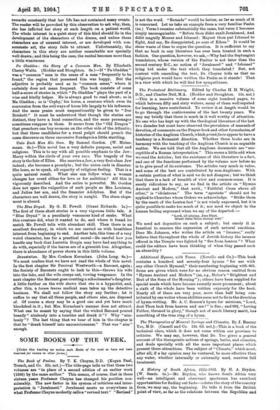The Protestant Dictionary. Edited by Charles H. H. Wright, D.D.,
and Charles Neil, M.A. (Hodder and Stoughton. 155. net.) —This is a massive volume of some eight hundred pages, to which between fifty and sixty writers, many of them well reputed for learning, have contributed. To review it at length would be to go through the controversies of the last twenty years. We may say briefly that there is much in it well worthy of attention. No one who has kept up with the theological literature of the last two decades but must have observed the prevalence of manuals of devotion, of comments on the Prayer-book and other formularies, of histories of the Anglican Church, which prinse/acie appear to have a tendency in a Romanist direction. Whether these books are in harmony with the teaching of the Anglican Church is an arguable matter. We are told that all the Anglican documents are "sus- ceptible of a Roman interpretation." This seems a little odd when we read the Articles ; but the existence of this literature is a fact, and one of the functions performed by the volume now before u3 is to give proof of its existence. The articles vary much in value, and some of the best are contributed by non-Anglicans. With a certain portion of what is said we do not disagree ; but we think that there is a lack of breadth of view and common-sense. It is surely ridiculous to say, as we find in the article on "Hymns Ancient and Modern," that xevii., "Faithful Cross above all other," is "idolatrous." The term " apostate " should not be applied to Churches whose Orders we acknowledge. "Strike them by the merit of the Lenten fast" is not wisely expressed, but it is quite possible to make too much of it ; nor need we object to the human feeling expressed when we say of the departed :— "Lord, all pitying, Jests Blest, Grant them thine eternal rest."
We need not dogmatise on such a subject ; but surely it is fanatical to censure the expression of such natural ernotious. Does Mr. Johnson, who writes the article on "Incense," really believe that throughout the whole of Jewish history the incense offered in the Temple was lighted by "fire from heaven " ? What could the editors have been thinking of when they passed such an absurdity ?






















































 Previous page
Previous page